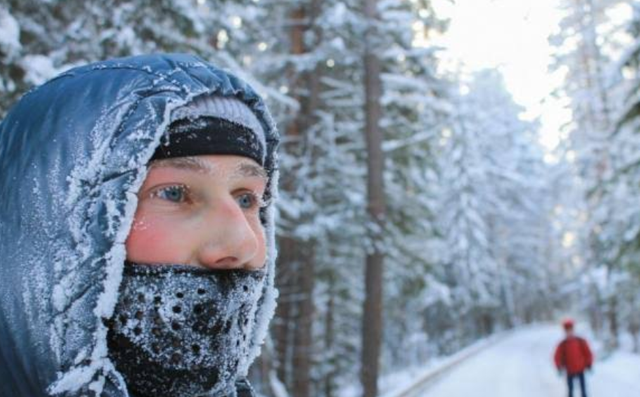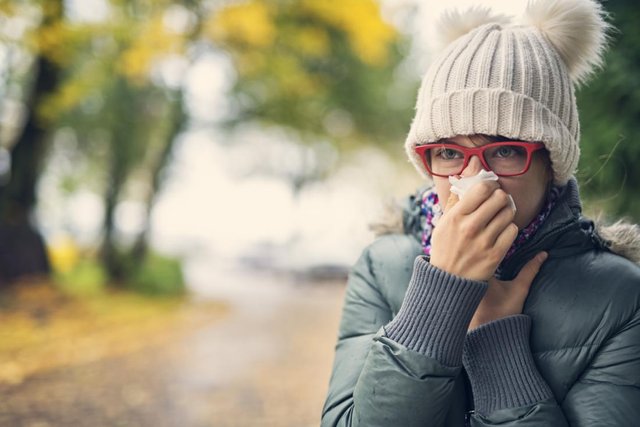How Does Cold Weather Cause Illnesses?

Many people associate cold weather with the common cold. While the weather is not directly responsible for making people sick, the viruses that cause colds may spread more easily in lower temperatures, and exposure to cold and dry air may adversely impact the body's immune system.
In this article, we examine the relationship between cold and wet weather and the common cold. We also cover some tips for preventing colds.
Rhinoviruses and the common cold

According to the Centers for Disease Control and Prevention (CDC), millions of people develop the common cold each year in the United States alone. On average, adults get two or three colds a year.
Many viruses can cause the common cold. Rhinoviruses are the most common cause and are responsible for more than half of all colds and cold-like illnesses.
Rhinovirus infections typically result in mild cold-like symptoms. However, rhinoviruses can also cause more severe illnesses, such as bronchitis and pneumonia, in people with weakened immune systems.
Rhinoviruses typically spread through:
- direct person-to-person contact
- the air as small droplets, or aerosols, which people then inhale
Once inhaled, the rhinovirus attaches itself to the cells inside the nasal passages. It then begins to replicate itself, spreading more virus particles throughout the upper respiratory tract.
Effect of cold weather on viruses
Some research suggests that rhinoviruses may replicate more efficiently at temperatures lower than 37°C, or 98.6°F, which is the average core body temperature in humans. The temperature inside the nasal cavity is approximately 33°C (91.4°F), which may make it an ideal breeding ground for rhinoviruses.
Most research on rhinoviruses has primarily focused on examining how differences in body temperature affect the virus's ability to reproduce. However, more recent research is focusing on environmental factors that may increase a person's risk of developing a rhinovirus infection.
One study examined whether or not variations in temperatures and humidity led to a higher risk of rhinovirus infection. The researchers found that decreases in both temperature and humidity over a 3-day period increased the risk of rhinovirus infections in participants.
In the same study, researchers found that the majority of infections occurred in temperatures at zero (32°F) and below.
Influenza viruses, which cause the flu, may also survive and spread more easily in cold and dry air. One study in guinea pigs suggests that the ideal temperature for the influenza virus to spread is 5°C (41°F).
Effect of cold weather on the immune system

Many researchers believe that exposure to cold weather can adversely affect a person's immune response, making it harder for the body to fight off infections. Reasons for this may include:
- Reduced vitamin D levels. During the winter months, many people get less vitamin D due to reduced sun exposure. Research suggests that vitamin D plays an essential role in maintaining the immune system.
- Spending more time indoors. People tend to spend more time indoors during winter months, and viruses spread more when people are close to each other.
- Lower temperatures may affect immune response. A 2015 study found that exposing airway cells taken from mice to lower temperatures decreased the immune response of the cells against a mouse-adapted rhinovirus.
- Blood vessel narrowing. Breathing in cold and dry air causes the blood vessels in the upper respiratory tract to narrow to conserve heat. This may prevent white blood cells from reaching the mucous membrane, making it harder for the body to fight off germs.
Prevention
Some ways to avoid getting sick during the winter include:
- taking vitamin D supplements or eating foods that are high in vitamin D, such as fatty fish, mushrooms, and eggs
- getting plenty of sleep
- staying hydrated
- washing hands regularly
- always sneezing and coughing into clean tissues; if no tissue is available, it is better to use an elbow rather than the hands
- not sharing foods, drinks, crockery, and utensils with people who have a cold or the flu
Takeaway
Viruses, such as rhinoviruses and influenza, cause colds and the flu, not the weather. However, exposure to cold weather can increase a person's risk of contracting a virus.
Research suggests that these viruses may survive and reproduce more effectively at colder temperatures, making it easier for them to spread and infect more people. Cold weather may also reduce the immune response and make it harder for the body to fight off germs.
Posted from myAirClinic Healthcare App. Download Android Version from PLAYSTORE!
You are right, friend. Cold temperatures can affect several diseases because cold temperatures can make some germs and viruses multiply quickly. When it rains, I often catch the flu. So is my mother. she will suffer once if the temperature is cold because cold temperatures can cause her rheumatic disease to recur.
sometimes it is also true, cold weather can invite diseases that we did not expect before
Congratulations @air-clinic! You have completed the following achievement on the Steem blockchain and have been rewarded with new badge(s) :
You can view your badges on your Steem Board and compare to others on the Steem Ranking
If you no longer want to receive notifications, reply to this comment with the word
STOPVote for @Steemitboard as a witness to get one more award and increased upvotes!